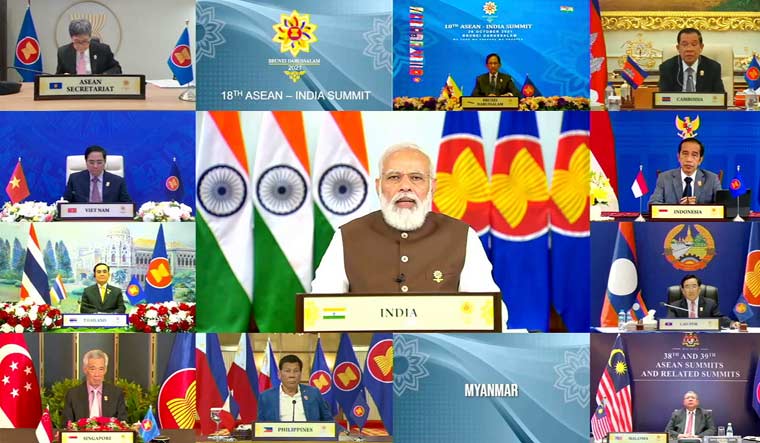
India’s vice president recently travelled to Cambodia’s Phnom Penh to take part in the 19th ASEAN-India Summit.
Key highlights
- The foundation of India’s ACT-EAST policy is the relationship with ASEAN.
- India continues to support ASEAN’s centrality in the Indo-Pacific, he said.
Joint statement by ASEAN and India
- Changing the current strategic partnership into a comprehensive strategic partnership.
- The significance of preserving and advancing peace, stability, maritime safety and security, freedom of navigation, and overflight in the Indo-Pacific area was reaffirmed.
- The determination to strengthen India-ASEAN collaboration in a variety of areas, including marine activities, anti-terrorism, transnational crimes, cyber security, and the digital economy.
- Suggests hastening the revision of the ASEAN-India Trade in Goods Agreement (AITIGA) to make it easier to use, more straightforward, and conducive to trade.
- Both sides agreed to enhance cooperation in the space sector including “through the establishment of Tracking, Data reception and Processing Stations in Viet Nam and Indonesia.
- They reiterated the need for increased coordination and dialogue through ASEAN-led forums such as the Expanded ASEAN Maritime Forum, the ASEAN-India Summit, the East Asia Summit, the Post-Ministerial Conference with India (PMC+1), the ASEAN Regional Forum (ARF), the ASEAN Defence Ministers’ Meeting-Plus (ADMM-Plus), and the ASEAN-India Summit (EAMF).
- In order to guarantee a “future-ready, resilient, sustainable food supply,” the two parties decided to intensify their cooperation in the digitally supported agriculture sector.
India- ASEAN Relations
- In 1992, India started a formal dialogue with ASEAN as a “Sectoral Dialogue Partner” (and later, as a “Dialogue Partner” in 1996).
- India and ASEAN have had a dialogue partnership for 25 years, contact at the summit level for 15 years, and a strategic partnership for 5 years.
- Financial commitments
Three main formal institutional mechanisms to promote the India-ASEAN economic ‘connect’
1) ASEAN Economic Ministers-India Consultations (AEM + India)
The Commerce Minister attends meetings of the ASEAN Economic Ministers (AEM), one of the principal ASEAN ‘sectoral groupings’. A review of AITIGA has recently been the main topic of discussion at AEM-India sessions.
2) The ASEAN India Framework Agreement on Comprehensive Economic Cooperation (2003)
- The accord gives the formation of an ASEAN-India Free Trade Area a ‘mandate’. Its provisions are as follows:
- ASEAN-India Trade in Goods Agreement (AITIGA, signed)
- The ASEAN-India Trade in Services Agreement (AITISA, was signed in 2014 and parties ratified it in 2018).
- The agreement on Investment (signed in 2014) has been finalized and ratified by all parties.
3) ASEAN-India Business Council (AIBC)
- It was established in 2003 to support India and ASEAN region’s Comprehensive Economic Cooperation.
- It is meant to serve as a private sector mechanism to provide Governments on both sides with authoritative feedback on their current policies and also recommend steps that Governments could take to further promote the ASEAN -India economic partnership.
Financial Cooperation
- The Indian government has established three funds to support ASEAN-India cooperation activities: ASEAN-India Cooperation Fund (AIF)
- ASEAN-India Green Fund (AIGF)
- ASEAN-India Science and Technology Development Fund (AISTDF).
